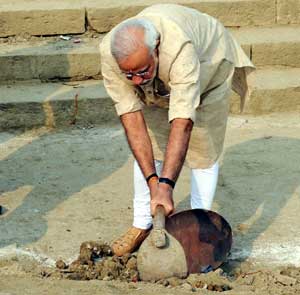Modi, in a recent interview to a news agency, said the 'Swachh Bharat' mission has been started to see that health and hygiene issues of the poor do not affect their working capacity and output. “We took up the task of providing toilets in all schools. It is going to be completed in next few months. Don’t children of the poor study in these public schools?,” averred Modi. He was replying to a specific question that his detractors allege that the Modi is pro-corporate, anti farmer and anti poor government.
Besides 'Swachh Bharat' mission, he enlisted many other programmes launched for the common man.
Prime Minister retorted, “these are just a few examples. What prevented these things from being done effectively during the last 60 years?” In every household, kids are taking lead reminding their elders that cleanliness should begin from the home, ''Your question also points at the same thing , I do strongly believe that if every citizen decides to to be partner of the Swachh Bharat mission that leanliness would automatically be there in the entire society. He said that if every citizen be concerned of it, then cleanliness would prevail everywhere.''
The 'Swachh Bharat' campaign ever since it was launched by the Prime Minister on Rajpath on October 2, 2014 has engineered public response and even at places, where social groups who had nothing to do with city’s hygiene got involved and many groups are now frequently seen in public parks clearing the debris. The Mission was launched with the objective of ensuring cleanliness and open defecation free urban areas in all 4,041 statutory cities by 2019. Estimated cost is ₹66,009 crore out of which the Centre’s share is ₹14,643 crores.
Official sources said physical targets include 1.04 crore household toilets, 2.52 lakh community toilets seats and 2.54 lakh public toilet seats and assisting 30 crore urban population with solid waste management practices. During 2014-15, about ₹800 crore has been released to 28 states/ UTs.Over two lakh household toilets have been built besides 12,000 community toilets during the year.
Government sources said 390 cities have reported 100 per cent collection and transportation of municipal solid waste. Standard operating procedures (SPO) were also issued by the government to ensure cleanliness during and after public gatherings and meetings. When correspondents interacted with people across the country, most of them quipped,” Bhai sahib, Modi ji ne lal quila par bola tha swachhta ke bare mein, hum to ab unke feed back ka intarzar karte hein on the Independence day“ (Modi had spoken about the cleanliness now, we await his feedback on August 15). Tone and tenor of people across the country was same, but they all admitted the buzz on the cleanliness front.
Now less than 40 days are left for Modi to address the nation from Red Fort from where he had appealed to finish task of providing toilets in all schools within a year. He had said that he wanted that all schools in the country should have toilets with separate ones for girls. “This target should be finished within one year with the help of state governments and on the next August 15, we should be in firm position to announce that there is not a school in India without separate toilets for boys and girls”.
The SBM, in tandem with large number of government agencies, is bracing to ensure toilets in every school in next few months besides gearing up for to ensure cleanliness during the coming world famous Kumbh Mela in Nashik on banks of river Goadavari from July 14 to September 25. Modi, in his latest meeting to review the programme, has directed authorities that spiritual leaders should be associated with cleanliness efforts during major congregational events like Kumbh Mela and Jagannath Yatra. Next year, the Kumbh will be held on banks river Shipra in Ujjain, Madhya Pradesh. Ever since Modi’s directives, authorities are working towards ensuring maximum ‘swachhata’, (cleanliness) in Nashik during the Mela where a vast multitude of humanity is expected to turn up for auspicious bathing. Many say that it will be real acid test of the mission and Modi has already advised to ensure maximum cleanliness by involving spiritual gurus to transform change people’s attitude towards hygiene.
The Kumbh Mela will not be an isolated case, but similar initiatives will be on the cards during the major religious event of Jagananth yatra in Puri Dham in Odisha.
Kumbh Mela will be celebrated at Trimbakeshwar in Nashik in Maharashtra. Trimbakeshwar is a holy town of Nasik as one of the twelve Jyotirlingas, Triyambakeshwar Jyotirlinga temple is situated there. Kumbh Mela in Nasik is celebrated once in every twelve years. The 'Swachh Bharat' mission has created a buzz, which may pave the way for its entry in English dictionaries which have over years co-opted words like bungalow, loot, bandh and toofan. The word Swachh is now frequently used as such and it has caught international attention and at times, its translation is not required.
Surprisingly, Swachh means hygienic in general perception, but in some camps, the word is “unhygienic” due to its political connotations. They aver it is only public stunt and nothing is happening on the ground, and going a step further these critics lace their perception by pointing towards urine-soaked walls even in the Lutyens zone in the national capital, “what to speak of the country’s mussy interiors?”. Billboards, posters, stickers sprung up across the country and institutions both private and public got involved in the drive, but only personal involvement of masses can ensure cleanliness, feel bureaucrats in power corridors, adding the government can only be a facilitator for such movements.
According to Modi, various channels took up a campaign to tell the nation that the 'Swachh Bharat' campaign is an opportunity to realise the dream of Mahatma Gandhi and a true tribute to pay the father of the nation on his 150th birth anniversary in 2019.
Even as special drives are underway to carry forward the 'Swachh Bharat' mission, Home Minister Rajnath Singh recently said that the mission was not only for cleanliness but basically about eradicating social evils like untouchability. The campaign will be self -defeating unless the government bodies provide adequate number of toilets at public places, a senior journalist, working with a language wire agency, Jai Parkash Awasthi said. He sarcastically commented that even in the country’s most posh Lutyen’s zone, drivers and people coming to the INS (Indian Newspaper Society) complex and wait for hours there, grope for bushes to pee. “Go and visit public toilets at bus stands, you will instantly contract urinary tract infection and unless the situation is not addressed, such mission fail to cut ice.''
Many others hold authorities responsible for the half-hearted approach. They say even in New Delhi station, platform one is kept spic and span but “what about other platforms?”.
Come what may, the word “Swachh” is making ripples, people say at public places, pointing towards lime streaks and stickers on walls and dustbins and but the same people also raise fingers at people still defecating in open and urine soaked walls at market places. Jingles on airwaves drum up support for the campaign and celebrities are flagging the cleanliness issue at public platforms.
Ever since, the mission gained momentum, a number of incidents took place and the Priyanka Bharti case of Maharajganj hit headlines, triggering debates. The 19-year-old bride had reportedly walked out of her husband’s house in protest against lack of toilet facilities. She was quoted as saying that “I would not eat or drink water through the day only so that I could avoid having to go out into the fields to relive myself. At night, the fields can be dangerous. It began to affect my health which is when I protested.''
Society exerted pressure on Priyanka to return to the martial house, but she did not give in. Then a social institution involved in the public toilet work chipped in and facilitated to build a toilet in her house. Now, she is travelling extensively to campaign for toilets in houses and increasing sanitation.
Priyanka is not alone in the crusade. A 32-year-old man got printed his wedding card last month with a message for the 'Swachh Bharat' mission in Ballari taluk of Karnataka. The card spread a message for encouraging people to construct a toilet compulsorily in their house to lead a healthy life. In a rare initiative, the UP government has approved a proposal of incinerators for disposal of sanitary napkins in 300 government inter college for girls. Sources said it will form part of the ambitious toilet block project coming up at cost of multi million rupees in the colleges in 73 districts. Modi reviewed the progress of the mission recently with officers of the ministries of the Urban development, drinking water supply and sanitation, NITI Aaayog and PMO. The PM sought latest feedback on toilets construction in all states. After comprehensively reviewing the situation, he directed concerned officers to specially coordinate with States which are lagging in toilet construction. He asked the 'Namami Gange' programme authorities that construction of toilets in habitations on the banks of the River Ganga should receive the highest priority. Modi said motivational incentives such as awards should also be instituted through official channels. In rural areas, the Prime Minister suggested quiz competitions among students to promote awareness. The Prime Minister also called for leveraging the huge interest that 'Swachh Bharat' has generated among the Indian diaspora.
Now, public sector undertakings are participating in a big way to construct and repair toilets. These include Coal India Ltd, NTPC, REC, Power Finance Corporation, Powergrid Corporation, NHPC and ONGC. Private corporate have also chipped in the task. The 'Swachch Bharat Kosh' has been set up under the Finance ministry to receive contributions. Funds from the Kosh are being made available to the Swachch Vidayayala' progarmme. The Railways is in the eye of storm over cleanliness because of complaints of dirty toilets, insects and mosquitoes in coaches. The ministry has taken up the issue in a big way. Officials say Plans are afoot to provide dustbins in all newly manufactured coaches including non-Ac from 2015-16 onwards. Besides, retro-fitment on existing coaches was has also been planned in addition to plans for garbage compactors. Separate directorate for environment and housekeeping has been created and integrated policy for cleanliness is under formulation.
Bio toilets have been introduced on the coaches to eliminate open discharge of fecal matter on the track. More than 17,000 such toilets had been fitted till March and equal number toilets will be fitted 2015-2016. Two sections have been identified to be made “zero toilet discharge”section by October 2, this year-Kanalus–Swarka-Okha and Porbander-Wansjalya. Jammu–katra and Manmadurai-Rameshwaram will be covered late in the year. All the trains originating and terminating and passing through will be equipped with bio-toilets.


















Related Items
A battle for dignity, Desperate civilians cry for safe public toilets
Campaign ‘Toilets: A place for peace’ this year…
Can Schools Assist Child With Chronic Disease? Parents Not Confident…